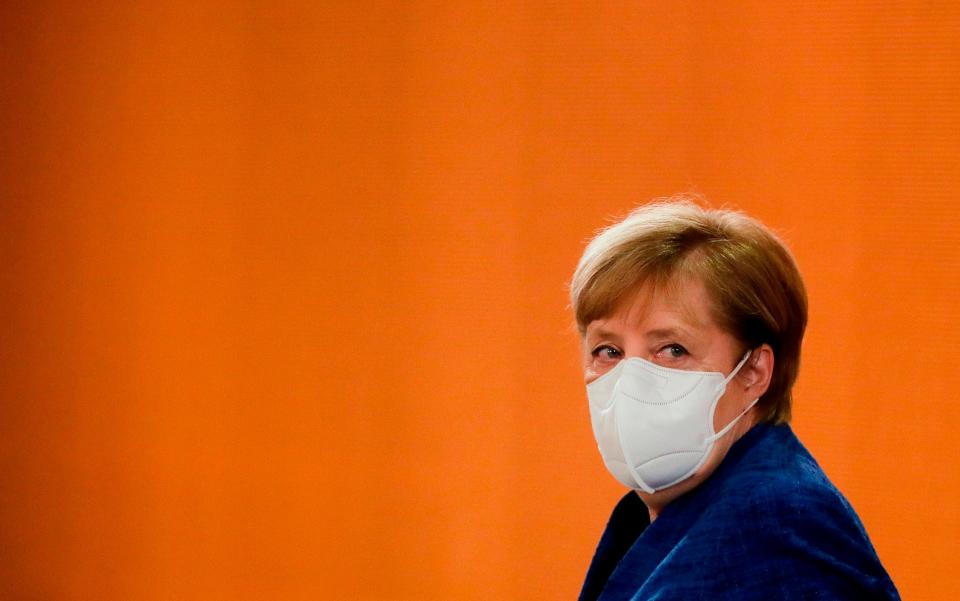Macron vows to scupper Brexit deal that 'sacrifices' French fishermen but faces renewed EU pressure

Emmanuel Macron has vowed to scupper any Brexit deal that “sacrifices” French fishermen, but faces a growing swell of pressure from Germany and other EU states to accept less access to British waters.
The French president’s hard line on fishing rights is one of the last remaining obstacles to an agreement. But with just a year and a half to go before national elections, being seen as the defender of France’s coastal communities could prove a valuable campaign asset for Mr Macron.
Battling the British over fisheries could help him shed the “president of the rich” label his critics have given him. Gilets Jaunes protesters vilify Mr Macron as indifferent to the concerns of rural communities, caring only for the metropolitan elites.
Boats from Brittany, Normandy and the Calais area catch more than half of their fish in British waters. The French, Dutch and Danish fishing industries would be all but wiped out if they were excluded or forced to drastically reduce their hauls.
For France, the fishing industry is a drop in the ocean in terms of national revenue, accounting for just 0.06 per cent of its overall economy.
Politically, however, it’s a different story. The industry is vital to parts of Brittany and the Calais area that are likely to be important battlegrounds in the 2022 election.
“Symbolically, fisheries are a big issue,” said Bruno Cautrès, a political analyst at the Cevipof thinktank. “Macron has to hold out for a deal that doesn’t hit coastal communities too hard and reinforce the perception that he only looks after the capital and the big cities.

But Mr Macron is under pressure from Angela Merkel, the German chancellor, not to torpedo nearly £700 billion in annual trade between the UK and the EU by blocking an agreement over fisheries, which are far less important to Germany.
“It would be very difficult for Macron to veto a deal if France found itself isolated in the EU,” Mr Cautrès said. “This issue is particularly important for France but not for all member-states.”
The French president has shown signs of moving towards a compromise.
The EU entered the Brexit talks with a demand to “uphold” access to British waters and existing rights to catch more than 70 types of fish that swim back and forth across the maritime border with the bloc.
At an EU summit last week, Mr Macron signalled some willingness to negotiate, saying he was looking for “a good compromise” on fisheries.
But the details could prove tricky to agree. Any reduction in catches that Britain is likely to offer could be hard for Mr Macron to swallow. Another sticking point is the French insistence on a permanent or long-term deal rather than annual talks to set hauls as the UK government wants.
Nevertheless, Mr Macron is showing signs of moving towards an agreement. However, it may be unpalatable for France’s 20,000 fishermen and 10,000 fish processing workers.
The president despatched Clément Beaune, his Europe minister, to talk to fishermen in Port-en-Bessin, in Normandy, during the summit in Brussels.
The minister tweeted: “One single objective: to defend and protect the interests of fishermen. We’re fighting… for French fishing.”
However, a representative of local fishing lobby groups said that he delivered a very different message off-camera, while on board a boat appropriately named L’Europe.
Jérôme Vicquelin told Reuters: “I was rather blunt and said [to Mr Beaune]: ‘It’s all well and good that you came, but I’m worried because… just a 10-15 per cent cut in turnover… would be a disaster over the long term.”
He added that the minister and his aides were equally blunt. “They said it won’t be the same as before. For me it’s clear, they want to try to limit damages as much as possible.”
The minister has confirmed Mr Viquelin’s account, if not his analysis, saying he warned the industry representatives not to expect to maintain “the status quo.”
In another sign that the French government is expecting a compromise despite its tough rhetoric, the head of a fisheries company in Brittany told the Telegraph: “The government has been sounding us out about whether we’re prepared to accept concessions and how far we would go, what we would agree to in terms of a smaller catch.”
Up to 20 per cent of French fishermen risk losing their jobs if quotas are drastically reduced, according to unofficial estimates. They have threatened to blockade boats carrying Britain’s catch. Most of the fish and seafood landed by British fishermen is exported, three-quarters of it to the EU.
Mr Macron is trying to pull off a delicate balancing act between fishing communities and the economic imperatives of trade.
If he does make concessions on fishing, EU diplomats believe a Brexit deal is possible, but he is concerned that French fishermen will take to the streets.
Even in France, where demonstrations are something of a national sport, mass protests could disrupt his re-election campaign, especially if the Gilets Jaunes joined in as a chance to revive their own movement.


